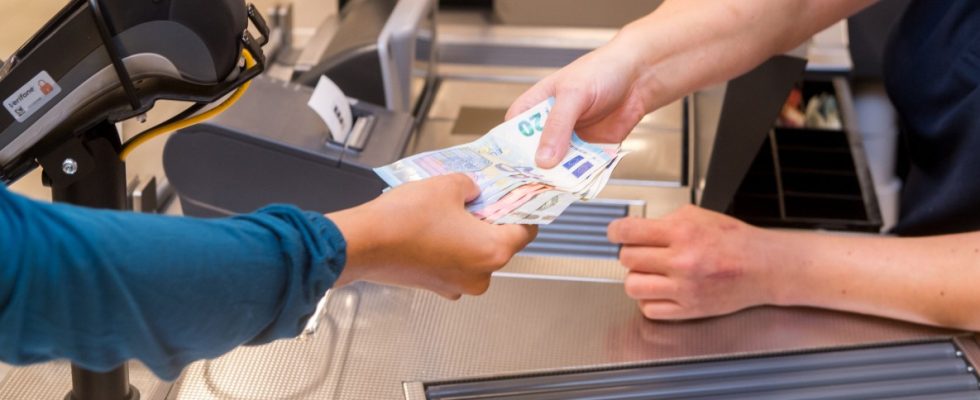It’s practical for customers: they save the trip to the ATM and can stock up on money while shopping. Withdrawing cash in supermarkets and other shops is becoming increasingly popular in Germany. However, this could still get the dealers offering them into trouble. This is the result of a study published on Wednesday by the Cologne retail research institute EHI. “More and more people want to withdraw money, but fewer and fewer people want to pay with cash. If the cash quota continues to decline, it will in some cases be difficult for retailers to fully maintain this service and meet demand. Cash would then have to be purchased from suppliers “says EHI study author Horst Rüter.
Dealers paid around 17.2 million euros in fees in 2023
The use and prevalence of cash withdrawals has increased rapidly. In 2019, retailers paid out 2.23 billion euros to customers, and in 2023 it was more than 12.3 billion. The service is offered, among others, by the food retailers Rewe and Edeka, drugstores such as dm and Rossmann and also hardware stores. Retailers have to pay for this; according to EHI, it is between 0.1 and 0.2 percent of the paid out amount per transaction. In 2023, companies paid fees of 17.23 million euros to the banks, 25.7 percent more than in the previous year. EHI payment expert Rüter predicts that the amount will continue to rise due to high demand. “This could mean that stores are not always able to pay out cash to customers, especially in the mornings when the checkouts are still empty. Retailers would then have to stock up on additional money,” he says. According to the study, the critical limit is reached when cash sales fall below 25 percent. How do trading companies deal with this? “We cannot see the predicted problems and bottlenecks for our group,” says a Rewe spokesman. In 2003, the supermarket chain was one of the first retailers to allow customers to withdraw money. From a purchase value of one cent, the service can be used with a debit card; the upper limit is 200 euros. No change is planned. The discounters Lidl and Aldi Süd do not comment on any plans or changes.
dm demands: Banks should waive fees
The drugstore chain Rossmann does not want to buy cash, as it explains when asked. This is not planned in the future either, and there are no plans to limit the offer. It is said that even in highly frequented sales outlets, all customer requests can usually be met. Rossmann only introduced cash payouts a year ago, for purchases worth ten euros or more. Competitor dm states that it is monitoring developments in the cash sector and checking the service for optimization. It would be “welcome if the banks would waive charging fees on the payout amount,” says a spokeswoman for the company.
Study author Rüter does not believe that retailers will stop offering them. However, a restriction is conceivable, for example in the form of a lower upper limit for the sums paid out. According to EHI, retailers are currently paying out 13.3 percent of the cash they collect back to customers. The share of cash in total sales fell by two percentage points to 35.5 percent in 2023 – and the trend continues to fall. Rüter expects it to be only 25 percent by 2025. Why are people withdrawing more and more cash even though they pay with it less often? This is also contradictory from Rüter’s point of view, but he still has an explanation. “Demand is also increasing due to the declining number of ATMs.” In addition, there are still many cash lovers in Germany who resist paying by card.

